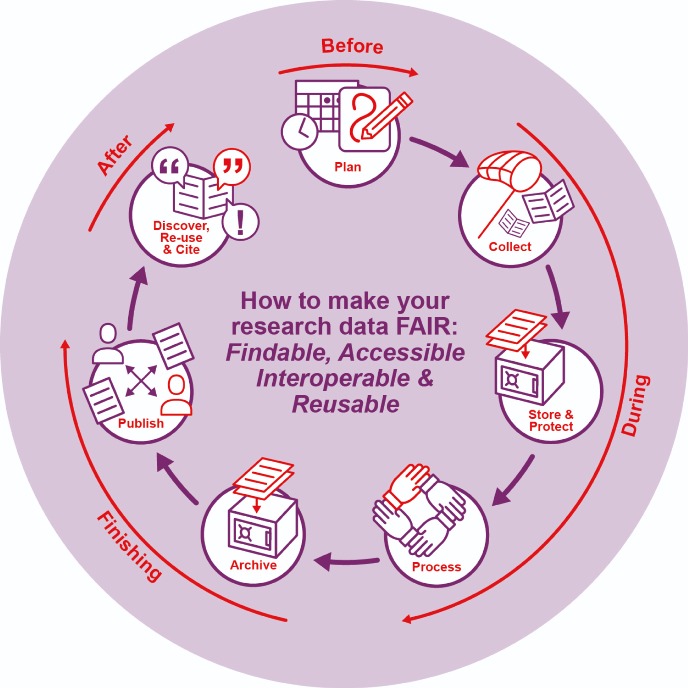FAIR data & Open Science
The DCC stimulates open science practices at the UG by helping its researchers to make their data FAIR: Findable, Accessible, Interoperable, and Reusable. The FAIR principles were introduced in 2016 and have become the norm for practicing open science and responsible data management:
-
Findable - easy discovery by both fellow researchers and computers
-
Accessible - availability to others, under well-defined conditions
-
Interoperable - easy integration and sharing across systems and platforms
-
Reusable - others can reuse your data for new research and reproduce your results
FAIR does not equal 'open'
FAIR does not equal Open
FAIR does not necessarily mean that your data is openly available to everyone. There can be reasons to restrict access to your data, for instance when this would affect the privacy of participants, intellectual property rights or commercial interests. The UG asks you to make your research data ‘as open as possible and as closed as necessary’.
Why is FAIR data important?
Why is FAIR data important?
If your research data is FAIR, it can be reused by fellow researchers from other institutions and disciplines. The benefits are for instance:
-
Better science - others can reproduce your findings, leading to more reliable research
-
Credit for your work - increased visibility and citations for your published articles and datasets
-
More impact - gain maximum potential from your dataset
-
Alignment with international standards and requirements of your institution and funder
-
Opportunities for new partnerships with fellow researchers and the broader community
How to FAIRify your data
Practicing FAIR means integrating the FAIR principles in your research workflow.

Before
Before
- Plan ahead by creating a Data Management Plan
-
Determine if there are reasons to restrict access to your data
-
Inform participants and partners in your research
During
During
-
Add data documentation and metadata information.
-
Update your Data Management Plan when changes occur.
Good data documentation is essential to ensure the reproducibility and reusability of your dataset. By giving attention to clear and detailed data documentation, you enhance the quality of your data and make sure that others can understand it.
You do this by including a Readme.txt file that contains an overview of the dataset and a description of its contents. Describe how you collected your data and which instruments you used, and include an overview of how your dataset evolved over time.
Finishing
Finishing
- Deposit your data in a generic or discipline-specific data repository
-
Verify, enrich and complete metadata, assign persistent identifiers (DOI, ORCID, etc.)
- Use common and open file formats
- Determine how your data may be reused by others
-
Link your dataset with publications, complete the Data Availability Statement
After
After
- Increase and track the impact of your data
- Handle requests from researchers to access your restricted data
Make your data FAIR through data repository DataverseNL
DataverseNL (DVNL) is a data repository managed and supported by the UG DCC and Library. It welcomes contributions from all disciplines. Deposited datasets and software receive rich metadata and a unique Digital Object Identifier (DOI) that allows for data citation. Datasets from DVNL are made ‘findable’ through the UG’s Research Portal.

